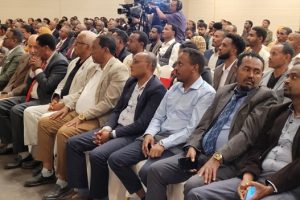
• Immigration dep’t to introduce overstay notifier
Abdoulbaqy al-Asbahi is Canadian national who has been visiting Ethiopia for the last two years. Holding tourist visa, al-Asbahi is now working in Ethiopia engaged in the service sector as an international broker around Bole Michael vicinity in the Capital, Addis Ababa.
The Ethiopian Herald has made an inquiry regarding the eligibility of al- Asbahi et al. to work in Ethiopia, bearing in mind the fact that he doesn’t have a work permit.
According to the Ethiopian labor law which governs all hiring contracts, wage and working hours of both expats and local staffs, thepossibility to hire foreign national is one; if the nature of the job is found to be difficult to be discharged by locals due to technological, technicality and knowledge gaps.
As a requirement, for a foreigner to be lawfully employed in Ethiopia, the individual needs to possess double permits; residence and work permits.
The power to issue residence permit is vested on the Security, Immigration and Nationality Affairs Department; while work permit is to be issued by the Ministry of Labour and Social Affairs, according to the Justice and Legal System Research Institute.
Expatriates can be employed in Ethiopia and they are expected to develop the local capacity, according to the Ethiopian Investment Commission.
There is no limitation on the number of expatriates that can be recruited. However, this also depends on the availability of local professionals, the complexity of the investment and the need for high skilled professionals, it further stated.
Under the civil service employment code, there is an express provision which stipulates ―a person who is not an Ethiopian national may not be eligible to be a civil servant. Nevertheless, the same instrument seems to provide exceptions to the general rule with respect to foreigners of Ethiopian origin.
In situations where it is impossible to fill a vacant position that requires high level professional by an Ethiopian, it is only for temporary bases that a foreigner may be employed, says Main Department for Immigration and Nationality Affairs Information Deputy Head, Yemane Gebremeskel.
Some expatriates have been deported for trying to manipulate the law of the country providing forgery licence, work and resident permits, Yemane adds referring to a single case that a Chinese national who comes to Ethiopia under the work permit of technological expert was found working as a cook of the Ethiopian traditional food- Shiro Wot in one hotel in the city of Bahir Dar.
The Ethiopian Investment Law states any foreign national who aspires to engage in any investment sector in Ethiopia is obliged to firstly deposit a minimum investment capital of US $ 200,000 in the Ethiopian National Bank. This will make the small office in Bole Michael run by the Canadian al-Asbahi to face lawsuit.
The other way that foreigners can work and stay in Ethiopia is through educational exchange and scholarships, according to the Immigration Department.
Yemane further says that the Department is working to install new technology system that can fit to serve and register the growing tourists and investment influx to Ethiopia.
“We are proving e-visa service and visa on arrival for all African nationals in line with the agenda 2063 of the African Union to promote the free flow of people though the follow up is not such as modernized as it should be.”
The registration and following up of foreign nationals entering to the country for different purposes is vested in the Main Department for Immigration.
The Department has studied and forwarded to the Council of Ministers to introduce an overstay notifier technology system to be installed in the country in order to tighten the security and safety of the country to identify those who overstay without extending their visa, and holding forgery and illegal working permit documents.
Herald December 13/2018
BY HAFTU GEBREZGABIHER





